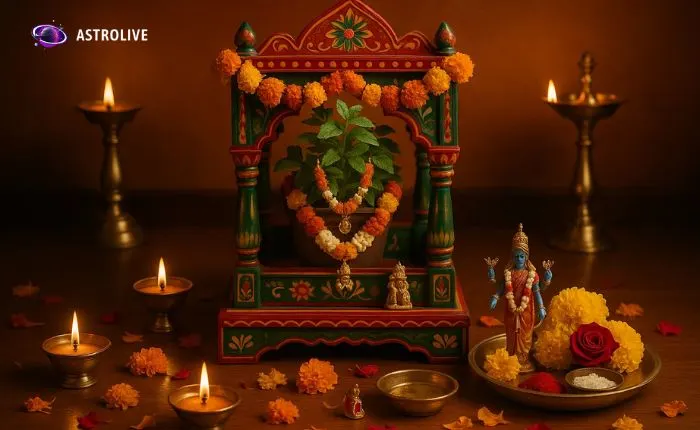Among the many vibrant festivals celebrated in India, Tulasi Vivah holds a deeply spiritual and cultural importance. It marks the divine marriage of Goddess Tulsi (the holy basil plant) and Lord Vishnu, symbolizing the union of purity, devotion, and prosperity. Observed during the month of Kartik (October–November), this festival bridges the end of Chaturmas a four-month holy period of rest for deities, and the beginning of the auspicious Hindu wedding season.
In countless Hindu households, the Tulsi plant is considered sacred and worshipped daily. But on this special day, the simple act of worship transforms into a grand ritual filled with love, joy, and spiritual energy. Families decorate the Tulsi Vrindavan (pot or altar), perform rituals, sing devotional songs, and reenact the divine wedding ceremony.
Beyond its ritualistic charm, Tulasi Vivah is a reminder of faith and devotion a festival that celebrates the eternal connection between human life, nature, and divinity.
The Story Behind Tulasi Vivah (Tulsi Puja Ki Katha)
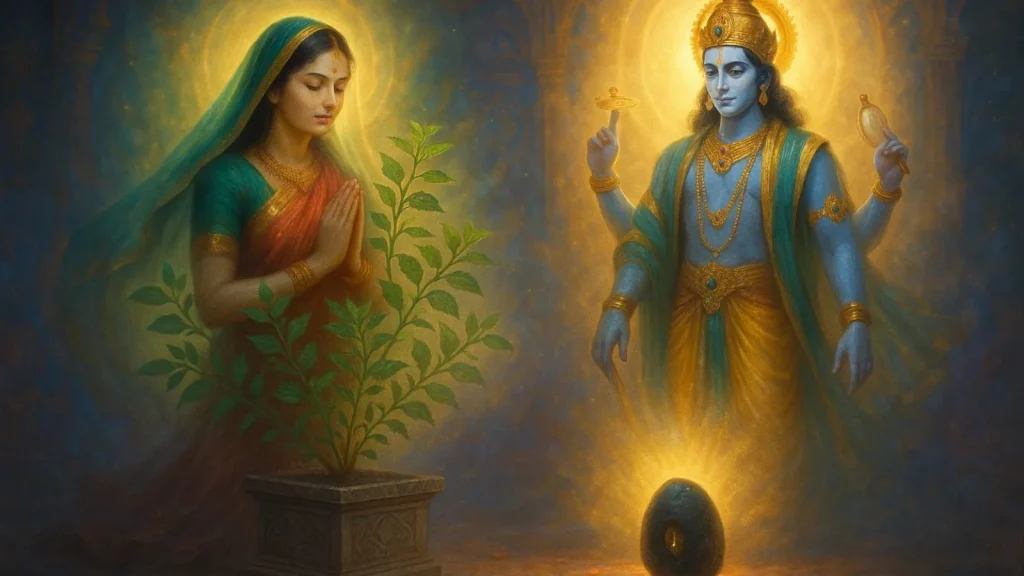
The story of Tulasi Vivah is rooted in deep devotion, transformation, and divine grace. According to Hindu mythology, Tulsi was once a woman named Vrinda, a devoted wife of the demon king Jalandhar. Her unwavering faith and chastity granted Jalandhar immense power, making him invincible even against Lord Vishnu.
To restore balance in the universe, Lord Vishnu took the form of Jalandhar and deceived Vrinda. When she realized the truth, Vrinda was heartbroken and cursed Vishnu to turn into a black stone known today as Shaligram. Overcome with remorse, Lord Vishnu blessed Vrinda by transforming her into the sacred Tulsi plant, ensuring she would be worshipped for eternity.
Their symbolic marriage, known as Vishnu Tulsi Vivah, represents forgiveness, purity, and divine union. It also marks the end of the Chaturmas period, which begins on Devshayani Ekadashi, the day when Lord Vishnu is believed to enter his cosmic slumber and concludes with Tulasi Vivah, signifying his divine awakening and reunion with Goddess Tulsi.
The ritual signifies the victory of devotion over ego and the eternal connection between the devotee and the divine.
This sacred tale, often narrated during Tulsi Puja Ki Katha, reminds devotees of the power of faith and the importance of living a virtuous life rooted in devotion and truth.
Also Read,
Devshayani Ekadashi 2025: Date, Spiritual Significance, Story & Rituals
Tulasi Vivah Kyon Manaya Jata Hai (Why Tulasi Vivah Is Celebrated)
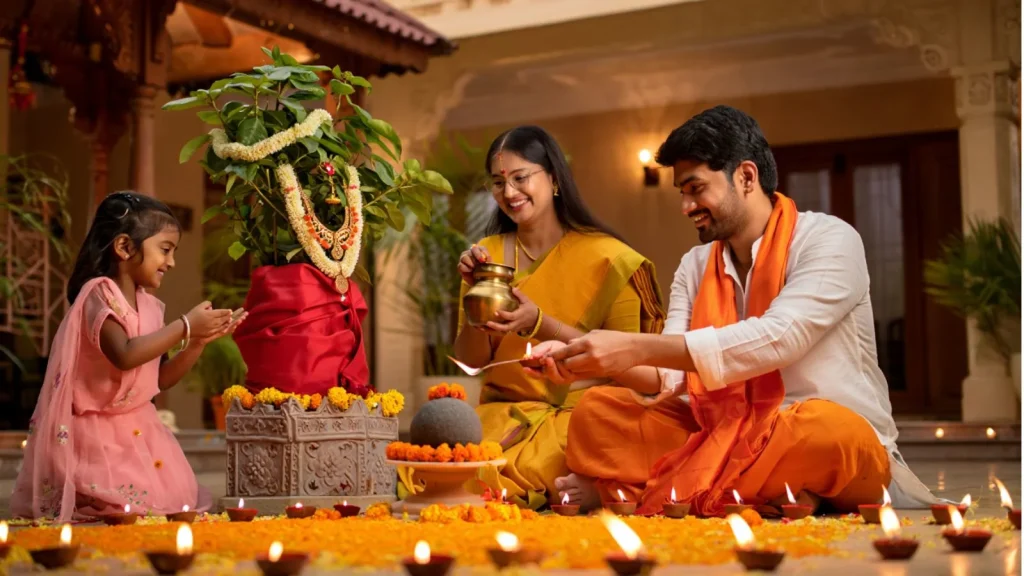
Tulasi Vivah is celebrated not just as a ritual, but as a festival with profound spiritual significance. It marks the end of Chaturmas, a four-month period during which Lord Vishnu is believed to rest, and many auspicious activities, like weddings, are avoided. By performing Tulasi Vivah, devotees symbolically invite Lord Vishnu back into worldly celebrations, blessing homes and families with prosperity and harmony. The timing of Tulasi Vivah also closely precedes Diwali, linking the two festivals in promoting spiritual renewal, family togetherness, and the triumph of light over darkness. Understanding Diwali and its significance adds depth to the celebrations, emphasizing devotion, prosperity, and auspicious beginnings.
The festival is also considered highly auspicious for seeking marital bliss and family well-being. It is believed that worshipping the Tulsi plant and participating in the vivah rituals brings divine blessings, strengthens relationships, and ensures a harmonious household.
Furthermore, Tulasi Vivah embodies the spiritual idea of union between nature and divinity. Tulsi represents purity and devotion, while Lord Vishnu symbolizes protection and divine support. Their symbolic marriage is a reminder that devotion, faith, and righteousness are rewarded, fostering a sense of spiritual fulfillment among devotees.
By understanding tulsi vivah kyon manaya jata hai, families can celebrate the festival with mindfulness, reverence, and joy, keeping the ancient traditions alive in modern life.
Also read,
Diwali 2025: Date, Significance, & How To Celebrate Safely
Tulasi Vivah Ka Mahatva (The Importance of Tulasi Vivah)
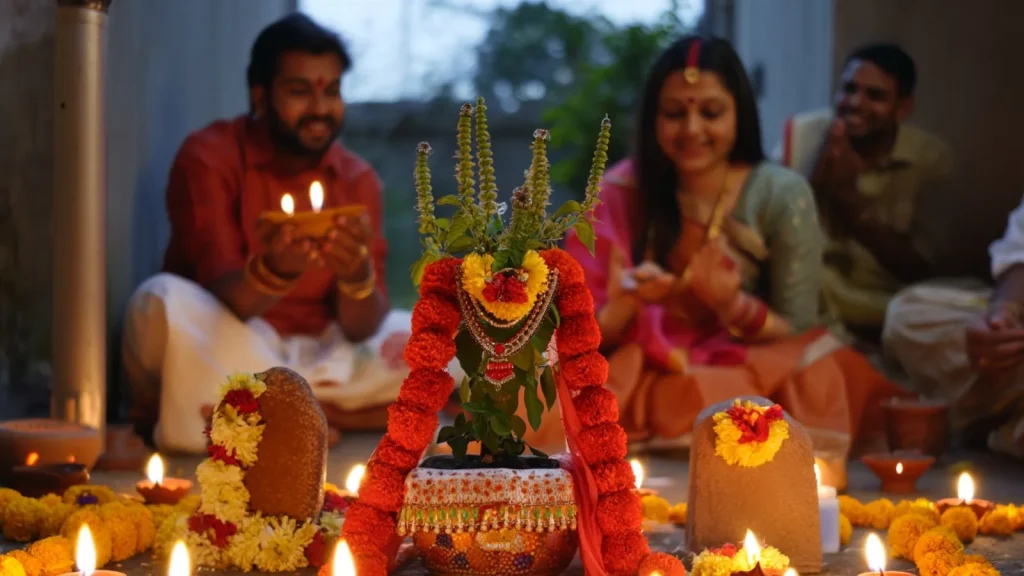
Tulasi Vivah is more than a ritual; it celebrates devotion, purity, and the bond between the divine and nature. Devotees honor Tulsi, seen as Goddess Lakshmi, and seek Lord Vishnu’s blessings for prosperity.
Key Points:
- Spiritual Significance: Purifies the mind and home, bringing peace, prosperity, and protection.
- Symbolic Connection: Represents the union of the human soul (Tulsi) with divinity (Vishnu), symbolizing harmony and righteousness.
- Cultural Value: Marks the start of India’s wedding season, encouraging traditions, community gatherings, and storytelling.
- Environmental Respect: Highlights Tulsi’s medicinal and ecological importance, fostering reverence for nature.
Understanding तुलसी विवाह का महत्व reveals the festival’s spiritual, cultural, and ecological wisdom, making it deeply meaningful.
How Tulasi Vivah Is Celebrated Across India
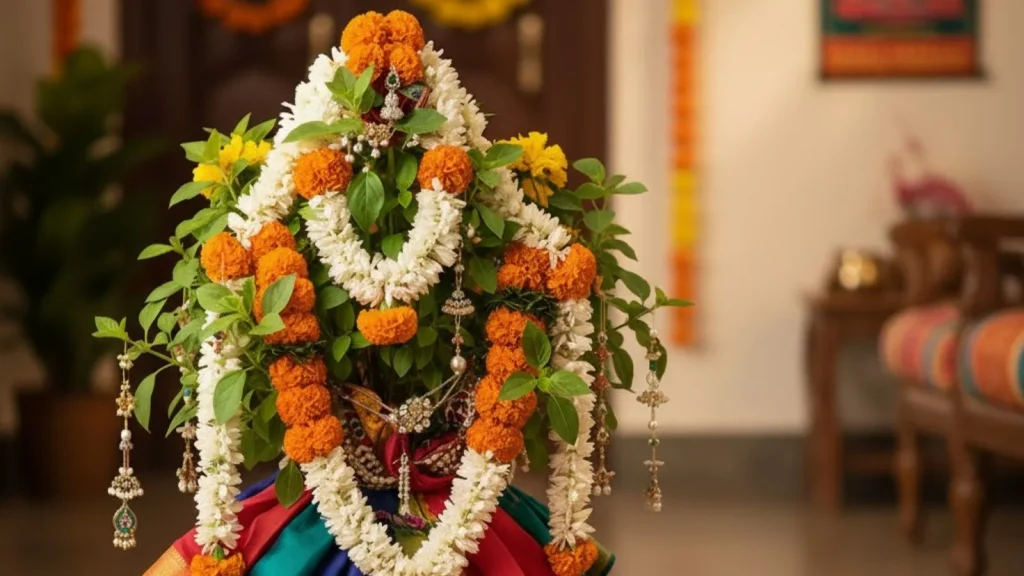
Tulasi Vivah is celebrated with great devotion and enthusiasm across India, though customs and rituals vary by region. Despite the differences, the central theme remains the same: honoring the sacred union of Tulsi and Lord Vishnu.
1. North India
In states like Uttar Pradesh and Bihar, families decorate the Tulsi plant with flowers, turmeric, and vermilion. Devotees perform puja early in the morning, offer sweets, and chant mantras from the Tulsi Vivah katha. In many homes, a small ceremonial idol or picture of Lord Vishnu is placed near the plant to symbolically conduct the wedding.
2. Maharashtra and Gujarat
Here, households create elaborate setups around the Tulsi plant. Families dress the plant with traditional wedding attire, perform rituals, and invite relatives to witness the celebration. Community gatherings often include singing devotional songs and distributing prasad (holy food).
3. South India
In states like Tamil Nadu and Karnataka, Tulsi Vivah is celebrated with a focus on temple rituals. Temples organize large ceremonies where the Tulsi plant is placed on a decorated pedestal, and priests conduct the vivah rituals. Devotees participate in chanting, offering flowers, and performing aarti (ritual of light).
4. Common Traditions Across Regions
- Decorating the Tulsi plant (Vrindavan) with flowers, cloth, and jewelry
- Performing the puja with offerings like fruits, sweets, and water
- Reciting tulsi puja ki katha and Vishnu mantras
- Concluding with a symbolic marriage ceremony representing the union of Tulsi and Vishnu
While regional variations add unique flavors to the festival, the core essence—celebrating devotion, purity, and divine union—remains universal. Families come together, share joy, and create a spiritual atmosphere that resonates with tradition and faith.
Rituals and Puja Vidhi of Tulasi Vivah
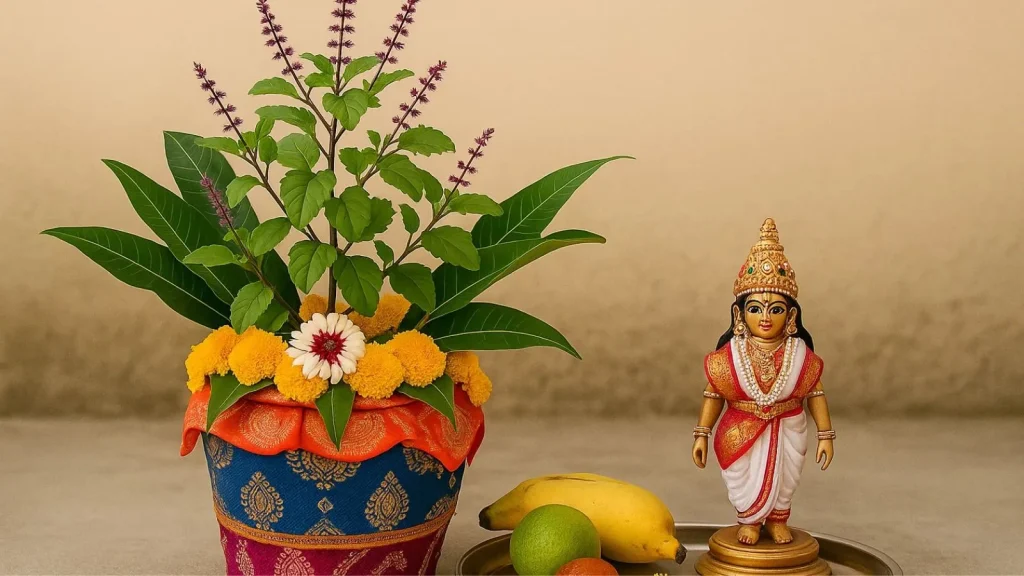
The rituals of Tulasi Vivah are performed with devotion and precision, symbolizing the sacred marriage of Tulsi and Lord Vishnu. Here’s a step-by-step guide to the traditional puja vidhi:
1. Preparation
- Clean the house and the area around the Tulsi plant.
- Decorate the Tulsi Vrindavan with flowers, mango leaves, and colorful cloth.
- Prepare offerings such as fruits, sweets, water, turmeric, kumkum (vermillion), and holy rice.
2. Placement of Lord Vishnu Idol or Picture
- Place an idol or image of Lord Vishnu (or Shaligram) near the Tulsi plant.
- Decorate the idol with traditional wedding attire and jewelry.
3. Invocation and Prayer
- Light a ghee lamp and incense sticks.
- Recite mantras and the Tulsi Vivah Katha (tulsi puja ki katha) to invoke blessings from the deities.
4. Symbolic Marriage Ceremony
- Tie a sacred thread or perform the mangal sutra ritual to symbolize the marriage.
- Offer turmeric, kumkum, and flowers to both Tulsi and Vishnu.
- Pour holy water around the Vrindavan as part of the ritual purification.
5. Concluding Rituals
- Offer prasad (holy food) to family members and guests.
- Sing devotional songs praising Tulsi and Vishnu.
- Some families also perform aarti to conclude the ceremony.
Following this puja vidhi ensures the festival is celebrated correctly, bringing spiritual blessings, prosperity, and harmony into the home. The rituals not only honor the divine marriage but also reinforce faith, devotion, and cultural values.
The Spiritual and Cultural Significance Today
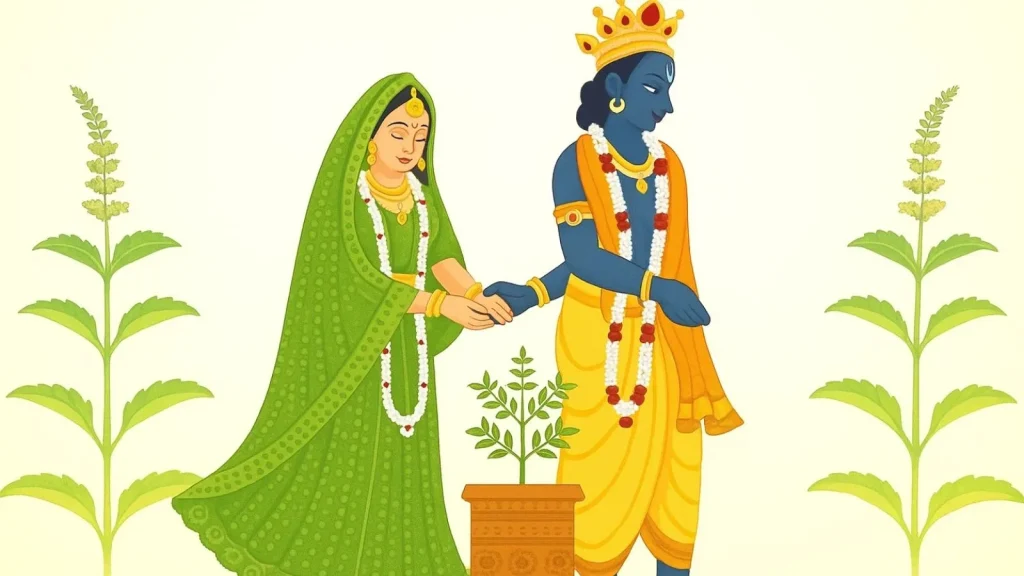
Tulasi Vivah continues to hold immense spiritual and cultural importance in modern times. While the rituals are rooted in mythology, their relevance extends beyond religion, influencing family life, social traditions, and cultural values.
1. Spiritual Significance
Participating in Tulasi Vivah nurtures devotion and mindfulness. Worshipping the Tulsi plant and performing the vivah rituals are believed to bring peace, prosperity, and protection from negative energies. It reminds devotees of the virtues of faith, purity, and righteousness.
2. Cultural Importance
Tulasi Vivah marks the beginning of the Hindu wedding season, making it a symbol of auspicious beginnings. Families come together to celebrate, sing devotional songs, and pass on traditions like the tulsi puja ki katha to younger generations, keeping cultural heritage alive.
3. Modern Relevance
Even today, many people continue to honor Tulasi Vivah at home or in temples. The festival encourages eco-consciousness by revering the Tulsi plant, known for its medicinal and ecological benefits. It also promotes social bonding, as neighbors and communities often gather to witness and participate in the rituals.
4. Devotion Meets Technology
With online platforms and astrology services, people can now access guidance for performing Tulasi Vivah correctly, ensuring that age-old traditions are followed even in modern lifestyles.
By celebrating Tulasi Vivah today, devotees continue to blend devotion, culture, and tradition, making the festival meaningful and relevant across generations.
How AstroLive Can Help You Celebrate Tulasi Vivah Spiritually?

In today’s fast-paced world, ensuring that religious rituals are performed correctly and at auspicious times can be challenging. AstroLive bridges this gap by offering convenient online services for spiritual guidance and astrology, making it easier for devotees to celebrate Tulasi Vivah meaningfully.
1. Find Auspicious Timings (Muhurats)
AstroLive provides accurate muhurat recommendations for Tulasi Vivah, ensuring that the ceremony is performed at the most auspicious time to receive divine blessings.
2. Personalized Puja Guidance
The platform connects users with expert astrologers who can guide them step-by-step on performing the rituals, decorating the Tulsi Vrindavan, and reciting the Tulsi Puja Ki Katha correctly.
3. Spiritual Insights and Consultations
AstroLive offers consultations to help devotees understand the spiritual significance of each step, making the experience more enriching and meaningful.
4. Convenient Online Access
Whether you live far from temples or have a busy schedule, AstroLive allows you to celebrate Tulasi Vivah from home while ensuring the rituals are conducted with devotion and precision.
By leveraging AstroLive, devotees can honor the tradition of Vishnu Tulsi Vivah with confidence, ensuring that their celebration is spiritually enriching, culturally authentic, and aligned with ancient customs.

Conclusion
Tulasi Vivah is more than a festival; it is a celebration of devotion, purity, and the sacred bond between Tulsi and Lord Vishnu. Observing this ritual brings spiritual blessings, prosperity, and harmony into homes while keeping ancient traditions alive.
With modern tools like AstroLive, devotees can easily perform the rituals at auspicious times, making the festival meaningful even in today’s fast-paced world. Celebrating Tulasi Vivah is a timeless way to honor faith, culture, and the divine connection between nature and spirituality.
FAQs
1. What is Tulasi Vivah?
Tulasi Vivah is the ceremonial marriage of the Tulsi plant (holy basil) with Lord Vishnu, celebrated to honor devotion, purity, and spiritual blessings.
2. When is Tulasi Vivah celebrated?
It is observed during the Hindu month of Kartik (October–November), marking the end of Chaturmas and the start of the wedding season.
3. Why is Tulasi Vivah important?
तुलसी विवाह का महत्व lies in its spiritual, cultural, and ecological significance. It symbolizes devotion, auspicious beginnings, and the sacred union of nature and divinity.


